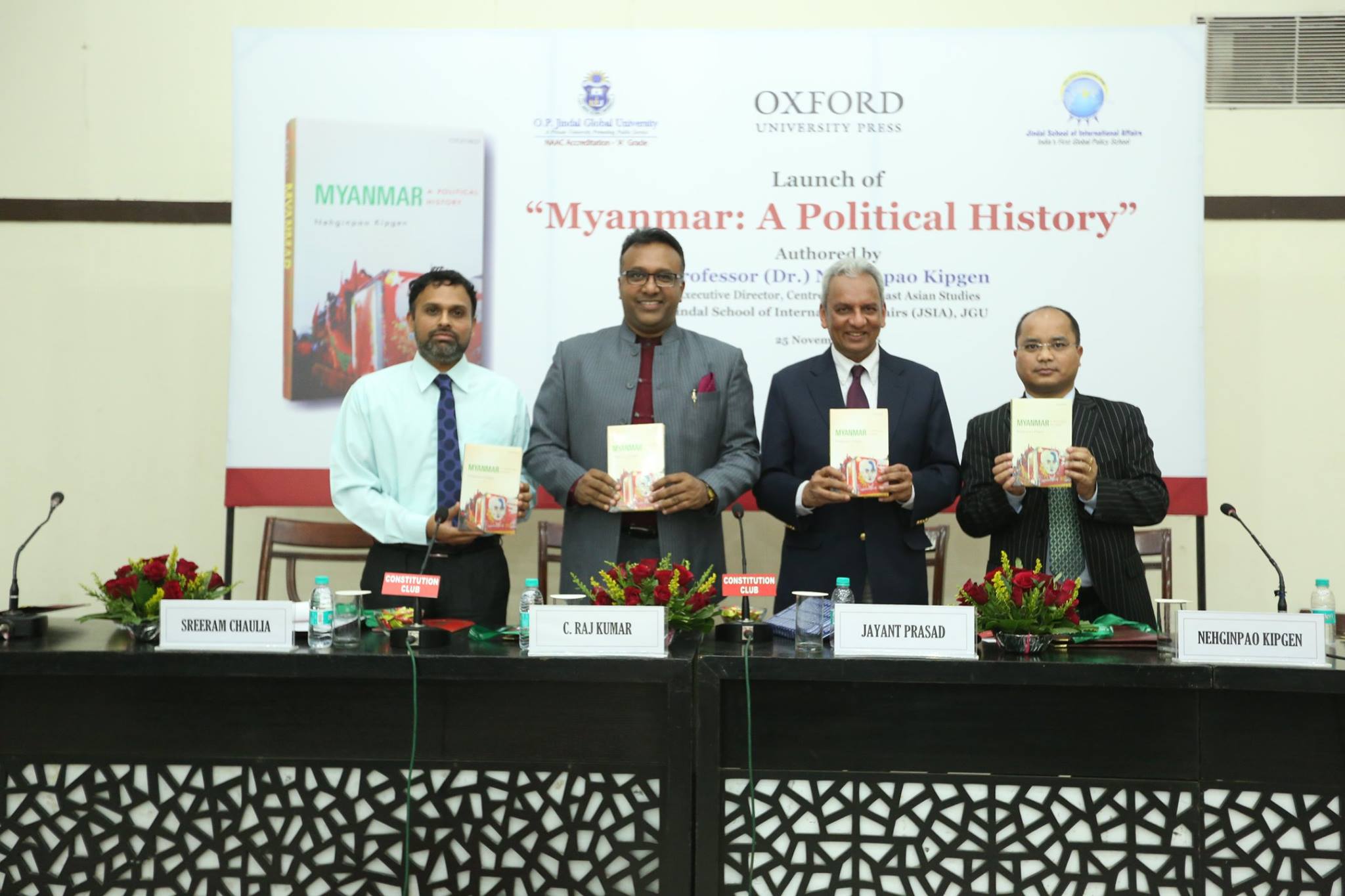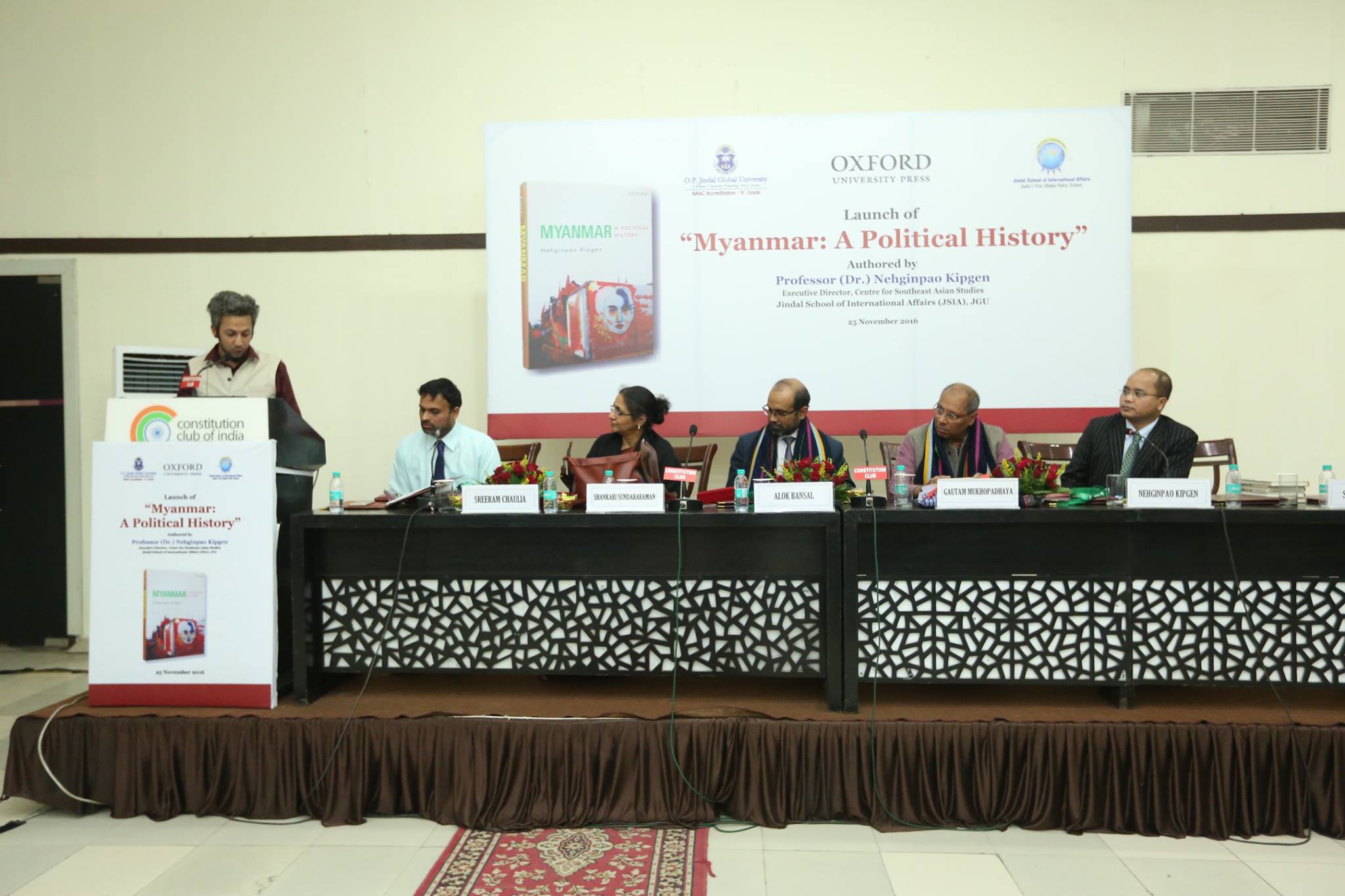 A new book examining the tumultuous transition of Myanmar from colonial rule to the establishment of its first civilian government was released at an elaborate ceremony by Ambassador Jayant Prasad, Director General, Institute for Defence Studies and Analyses at the Constitution Club in New Delhi. The book has been authored by a Southeast Asian Studies scholar. Dr. Nehginpao Kipgen and pieces together the country’s fall into military dictatorship and its transition from an authoritarian regime to a democratic government.
A new book examining the tumultuous transition of Myanmar from colonial rule to the establishment of its first civilian government was released at an elaborate ceremony by Ambassador Jayant Prasad, Director General, Institute for Defence Studies and Analyses at the Constitution Club in New Delhi. The book has been authored by a Southeast Asian Studies scholar. Dr. Nehginpao Kipgen and pieces together the country’s fall into military dictatorship and its transition from an authoritarian regime to a democratic government.
Dr. Nehginpao Kipgen is an Assistant Professor and Executive Director of Centre for Southeast Asian Studies, Jindal School of International Affairs, O. P. Jindal Global University.
Delivering the welcome remarks at the launch ceremony, Professor (Dr.) C. Raj Kumar, Vice-Chancellor, O.P. Jindal Global University, lauded Professor Kipgen’s contributions in scholarly research, and said, “Dr. Nehginpao is a remarkable scholar, researcher and respected public intellectual. He has done exemplary research work on the Southeast Asia region, and it is our privilege to be celebrating his contributions.”
Speaking on the launch of the new book, Prof. Kumar, observed, “In the Indian framework, the knowledge, information and most importantly understanding of Myanmar is relatively limited. I am hopeful that through the academic work of Prof. Nehginpao and the kind scholarly research and writing that he has consistently promoted, we will be able to develop a better sense of not only the beautiful country of Myanmar, but more importantly build a range of collaborative possibilities that will help develop substantive, stronger, deep and pervasive relationship between both countries.”
Chief Guest of the occasion, Ambassador Jayant Prasad, Director General, Institute for Defence Studies, congratulated Dr. Kipgen for producing an exceptional publication and termed the book as a valuable contribution to scholarship.
 Calling the book an insightful and lucid narrative on Myanmar’s political evolution, Ambassador Jayant said, “The book traces a threefold transition in the country’s evolution, first from military to civilian government, second the evolution of Myanmar’s relationship with the countries of its contiguity and also with the great powers and finally an active intra Myanmar dialogue for national reconciliation among and between ethnicities going back to the Panglong agreement of 1947, which unfortunately remained still born and is t
Calling the book an insightful and lucid narrative on Myanmar’s political evolution, Ambassador Jayant said, “The book traces a threefold transition in the country’s evolution, first from military to civilian government, second the evolution of Myanmar’s relationship with the countries of its contiguity and also with the great powers and finally an active intra Myanmar dialogue for national reconciliation among and between ethnicities going back to the Panglong agreement of 1947, which unfortunately remained still born and is t he root of some of the problems that contemporary Myanmar faces. It neatly relates the national, regional and international transition of the country.”
he root of some of the problems that contemporary Myanmar faces. It neatly relates the national, regional and international transition of the country.”
Ambassador GautamMukhopadhaya, Former Ambassador of India to Myanmar, said, “The book has been authored by a scholar from Myanmar, a country that is extremely important for India. The book is definitely being released at an opportune moment, as Myanmar has recently entered into a dramatic transition with a lot of uncertainty, it also sets the stage for a much better understanding of the issues we can expect and the times we are entering now.”
Speaking on the occasion, Professor (Dr.) Sreeram Chaulia, Dean, Jindal Schoolof International Affairs (JSIA), said, “We are proud to have Prof. Nehginpao Kipgen as a faculty member at JSIA. He is a prolific writer, commentator and an outstanding scholar. As a country expert, Prof. Kipgen has conducted extensive research on Myanmar, one of India’s most important neighbours and his new book, ‘Myanmar: A Political History’ is a lucid and well-researched narrative of contemporary Myanmar, which I am sure will prove to be a valuable guide to those interested in the future of Myanmar as well as South and Southeast Asiaregion.”
The book studies the different aspects of Myanmar political history: pre-independence to the first civilian government; the subsequent political transition from civilian government to military dictatorship, and the transition from authoritarian regime to a democratic government; and the importance of ethnic nationalities in the peace process.
It further explores Myanmar’s international relations: U.S. – Myanmar relations under President George Bush and President Barack Obama; examines Myanmar- China relations in three broad areas – politics, economy and military; India-Myanmar relations in the context of India’s look-east policy; cooperation problems on human rights within the Association of Southeast Asian Nations (ASEAN) with respect to Myanmar.
It also looks at the different patterns of political transition under two military dictatorships in Southeast Asia: Myanmar and Indonesia. Speaking at the launch ceremony of his new book, Dr. Nehginpao Kipgen, Assistant Professor and Executive Director of Centre for Southeast Asian Studies (CSEAS), JSIA, a political scientist who pursues a keen interest in comparative politics and international relations, said, “My new book studies the different aspects of Myanmar’s political history and its foreign relations, covering pre-independence to the first civilian government. It examines the politico-historical antecedents of contemporary Myanmar: from colonial rule to the establishment of its first civilian government.”
“I am hopeful that it will not only provide critical insights on the evolution of Myanmar, but also serve as a useful guide for academics as well as non-academics who have research and teaching interests, or a desire to understand the historical knowledge of Myanmar,” noted, Dr. Kipgen.
The book launch was followed by a panel discussion which saw the participation of distinguished members from the government and academia. Participants of the panel discussion included Ambassador GautamMukhopadhaya, Former Ambassador of India to Myanmar, Dr. ShankariSundararaman, Professor, School of International Studies, Jawaharlal Nehru University, Mr. AlokBansal, Director of India Foundation and Adjunct Professor, New Delhi Institute of Management.
Published by the Oxford University Press, the book comes at a critical time when after a lengthy process of government formation the country looks for some form of stability, even as the military still holds significant influence and power. The state has also been witness to recent armed conflict against the Rohingya Muslims, many of whom have been forced to flee to neighboring Bangladesh. Dr. Kipgen’s academic research focuses on South Asia and Southeast Asia, with specialization on Burma/Myanmar.


